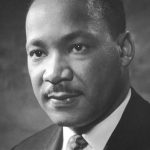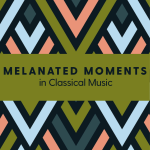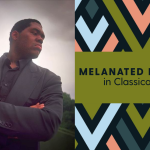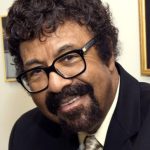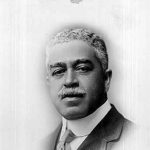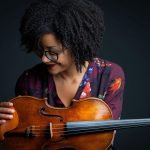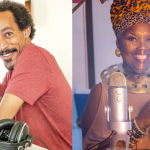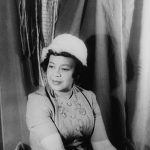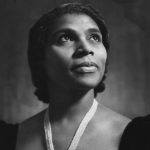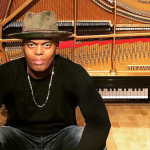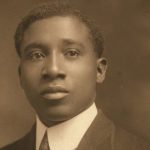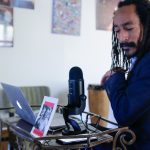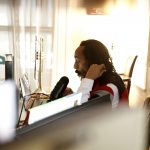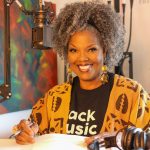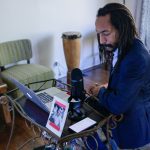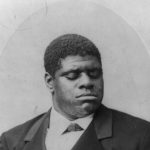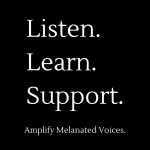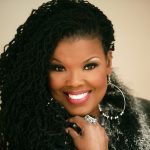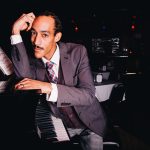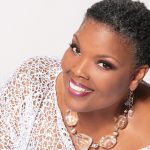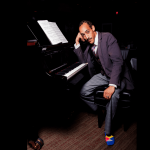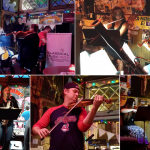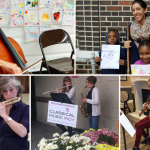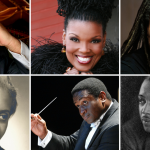MMCM S2E8: Performance as Preservation – Dr. Everett McCorvey
Angela and Joshua explore the depths of the American Negro Spiritual with Dr. Everett McCorvey, noted tenor, conductor, and founder of the American Spiritual Ensemble. They explain how the American Negro Spiritual differs from gospel, its foundational relationship to American music, and how the art form transcended from the cotton fields to concert halls worldwide.
Featured Music:
“You Must Have That True Religion,” by Roland Carter, performed by American Spiritual Ensemble
“Soon I Will Be Done,” arranged by Robert Jefferson, performed by American Spiritual Ensemble
“Didn’t My Lord Deliver Daniel,” performed by American Spiritual Ensemble
Music Plays (00:05): [MMCM Theme] Angela Brown (00:15): Hello, welcome back. I’m Angela Brown… Joshua Thompson (00:19): And I’m Joshua Thompson… Angela Brown (00:20): And this is Melanated Moments in Classical Music. Joshua, chile, we have had some awesome, heavy hitting guests on Season Two that have opened our hearts and minds and attitudes about what music is out there that is for, by and, about Black people. I mean, there’s so much more to uncover and we’re just tipping the iceberg on the wonderful contributions that Blacks have made in music, actually going all the way back to the American Negro spiritual. Joshua Thompson (00:56): I know that is right, but people don’t know that the American Negro spiritual is actually the only original — that’s a key point, right, ’cause we’re going to come back to that — original musical art form that is strictly American in nature. And it was created out of the slave fields of the South, which we all know is this horrible time in American and global history. But you know how we do Angela, we turn something wretched into something beautiful! Angela Brown (01:26): Okay! And Joshua, a lot of people think that singing a spiritual is singing gospel music, but baby, I’m here to tell you today, that is not the truth! Unison (01:35): [Laughter] Angela Brown (01:35): But before I get too far ahead of myself, as I usually do, I want to say: I am so excited to welcome Dr. Everett McCorvey, founder and conductor of the American Spiritual Ensemble, with us today. Now this is a quote that was taken from their website: “The American Spiritual Ensemble’s mission is to preserve and continue the tradition of storytelling through the performance and preservation of the American Negro spiritual. These melodies now stands as a testament of the strength found through faith during times of hardship, as well as a unifying force among all peoples. These songs are beloved around the whole world today.” Joshua Thompson (02:29): Absolutely. I love that, that tradition of musical storytelling. And you’re absolutely right. Now, I understand Angela– because you know everybody and you done all the things– you were actually a part of this ensemble as well. But before you regale us aplenty with your stories, and I’m sure they are quite legendary, let’s go ahead and get Dr. McCorvey on the mic. Shall we? Angela Brown (02:53): Yes, let’s do that. Melanated Moments, please welcome, Dr. Everett McCorvey. Dr. Everett McCorvey (02:59): Hello, hello! How are you? Angela Brown (03:06): Welcome. Welcome. Honey, come to the welcome table. We’re just going to sit here and feast and learn about the American Negro spiritual. Tell me doc, how important is the American Negro spiritual to the actual quilt, or tapestry of American music? Dr. Everett McCorvey (03:29): The American Negro spiritual is to a quilt like fabric is to the quilt. And, uh, so, uh, the American Negro spiritual, I call it the Mother Music of American music, and from the spiritual came many forms of American music. Jazz, blues, gospel came out of those forms, but the Mother Music, the music that got it all started in this country was the spiritual. Think about the fact that, uh, we have just gone through, you know, the 400th anniversary of the enslaved stepping foot on American soil. And before then, the music that was American was not really American. It was a hybrid of what the Europeans had brought to this country. So, Irish and French and German British, this was the music because America really had not found its voice. And then you had the advent of the spiritual happening. After the spiritual, America began to find its voice, uh, because it took a lot of the styles that were created doing spirituals and created by spirituals and sort of transformed into what we know now is, of course, jazz, blues, gospel, pop, Broadway, all of those– you know, all of those genres can be traced back, in some way, to the spiritual. Angela Brown (05:05): Wow. Joshua Thompson (05:06): And I love that you’re making these distinctions Dr. McCorvey, because I have a legitimate question for myself. A lot of times, myself and others hear the term spiritual and we automatically think that spiritual and gospel are one and the same. So where is the difference between the two or is there a difference, um, because we are still putting this in this, in this wonderful cannon of classical music to which it absolutely fits. But how do you frame this so that we can highlight those distinctions? So we can kind of help tell this narrative, this musical storytelling, like your ensemble is dedicated to doing. Dr. Everett McCorvey (05:45): Well, thank you. And that’s a very good question. And actually it was one of the reasons that I started the American Spiritual Ensemble when I finished college and I started working professionally. Uh, what I noticed fairly early was that, uh, gospel music and spirituals were being sort of lumped into the same category. And your audience will probably remember– and you, right? You probably will remember the company, Tower Records. Did you ever go into Tower Records in New York? I’m sure Angela did. Angela Brown (06:18): Oh, yeah. Dr. Everett McCorvey (06:18): But you know, I would always think of going into a place like Tower Records and going to the classical music section or folk music section and looking for spirituals. And the only way I could find it as if it was clumped under gospel music. And I thought, ‘Well, wait a minute these, aren’t the same things’. And uh, the spirituals were here before gospel music. And so I’ll give you a couple of, I guess, definitions. We’ll start with the spiritual as– let’s call the spirituals the folk songs of the American Negro slaves. Angela Brown (06:57): Oh, okay. Joshua Thompson (06:57): I love that. That helps, that helps. Dr. Everett McCorvey (06:59): Yeah. And so these were songs that were created in the cotton fields. These were songs that were created during, you know, as you mentioned earlier, a very difficult time in our history. And they started off as simple melodies, and these melodies were then ‘call and response,’ which was another American musical form that grew out of slavery. One person was sing, and another person would respond to that singing. And so in spirituals, you– it’s typically a simple melody, either sung a cappella or with one accompanying instrument, typically a djembe, or an African drum. And then the more modern arrangements will have piano, but that’s pretty much it that you will find in the spiritual. The gospel really came on in the early 1900s– 1920s and 1930s– when gospel music came sort of into light. And in gospel music– it’s a more popular, uh, musical form. You typically have, um, you know, maybe drums, uh, like a drum set. You might hear, uh, guitars, uh, playing as well. Uh, and so there are more popular music instruments that play along with the gospel music. The text is typically, you know, maybe a New Testament, uh, text– typically not a lot of words, but a phrase that is repeated over and over. And so it distinguishes itself from the spiritual in that it’s a much more popular music form. Angela Brown (08:53): Okay. Dr. Everett McCorvey (08:53): Now I can tell you the whole history of how it got there– Angela Brown (08:57): [Laughter] But before you do.. Unison (08:58): [Laughter] Dr. Everett McCorvey (08:58): Because we are riveted by the conversation, but we want to get at least one song in here. Joshua Thompson (09:06): But here’s the– I didn’t even know that you– I, now I’ma start calling gospel music– I’ll start calling it pop spiritual. I like that, love it! Angela Brown (09:10): See! But one of the songs I think hitting on one of the different types of, um, spirituals that we may hear is a call and response spiritual. And I think true religion is like that. Wouldn’t you agree? Dr. Everett McCorvey (09:28): Oh, yes. Oh, absolutely! Angela Brown (09:30): So let’s listen to ‘True Religion’ by– give me the composer, doc– Dr. Everett McCorvey (09:34): Roland Carter– Angela Brown (09:38): Thank you! Dr. Everett McCorvey (09:38): “You Must Have That True Religion!” Angela Brown (09:38): That’s right, by Roland Carter. Music Plays (09:38): [Roland Carter, “You Must Have That True Religion”] Dr. Everett McCorvey (14:18): That’s wonderful. And you know, we didn’t say who the soloists were, but they were our own beloved Angela Brown. Joshua Thompson (14:24): Come on, now! Angela Brown (14:24): I’ll tell you doc, I love singing with the American Spiritual Ensemble. Tell me how long has the American Spiritual Ensemble been in existence? Dr. Everett McCorvey (14:38): Well, we just finished, uh, right before COVID started in March when the world shut down, we were, we were at the end of our 25th anniversary. And so, uh, 2021 is our 26th anniversary of the group. I started it in 1995. Angela Brown (15:02): Uh huh. Dr. Everett McCorvey (15:02): And, uh, I started it, uh, as I mentioned earlier, because I wanted to really help to solidify the place, the spirituals in the place of the musical Canon. And, uh, my first year I, I got some of my graduate students from my university. I teach at the University of Kentucky. Angela Brown (15:23): Uh huh. Dr. Everett McCorvey (15:23): And a few professional friends, and we started, and then the popularity of the group, uh, sort of came on so fast that I have to stop using students per se, that were, you know, in class and, and just auditioned professional singers. And so now it’s an all professional group and we are the only group in the United States that’s solely dedicated to the preservation of the American Negro spiritual. So we are very excited about that. And we have a roster of about 125 singers. Angela Brown (16:01): Wow! Dr. Everett McCorvey (16:02): We only tour about 24, 25 singers and, you know, they are all professional in their own areas, professional singers, and we are happy to take you any time that you are available. Unison (16:18): [Laughter] Angela Brown (16:18): And you know I’d jump at the opportunity to sing with the ensemble whenever I can. So now tell me how- I know how we all get together and produce this high quality music, but how is it that you can have singers, a roster of over a hundred singers, all professional singers and come together to make this beautiful music? How do you put it all together and how do you select who’s going to be on tour? Dr. Everett McCorvey (16:47): Well, I think that one of the things that I work on is… When you are developing a group like this, you have to be specific in the types of voices that you hire. You know, you’re going to hire a soprano. There, there are in the, in the world of singing, you know, you have four or five different types of Sopranos. It’s not just a generic soprano. Angela Brown (17:12): Right. Dr. Everett McCorvey (17:14): And, uh, and so in my group, I’m typically looking for three types of Sopranos. I’m looking for a soprano who lives in the stratosphere. I’m looking for a soprano who is very comfortable in the middle of her voice. And I’m looking for a soprano that’s in the com- comfortable in the lower part. Now that’s just soprano. Do you have that same thing for mezzos and the same for tenor, baritone, and bass? So I’m looking for specific voices. And the reason the roster is so large is when someone auditions, they don’t audition to get into the group per se, they audition to get on the roster. Angela Brown (17:57): Ooh. Dr. Everett McCorvey (17:57): So that down the road, you know, depending on what, what the needs are, if I need a stratospheric soprano, then I’m going to go to my roster and look for that type of soprano. Not all the Sopranos on the roster can sing in that manner. So I look for that. And then, uh, the, the group that was on tour gets the right of first refusal for the next tour. So that’s why if Angela is on tour and then I may offer her the next tour, but she’s not available, then I have to go to my roster to try to find somebody like Angela. And of course that’s a hard role to fill, right? Unison (18:49): [Laughter]. Joshua Thompson (18:49): What chu sayin’, you might have soprano A through Z, but you need… Dr. Everett McCorvey (18:49): That’s right… but you don’t have an A.B. soprano, Angela Brown. Unison (19:00): [Laughter]. Dr. Everett McCorvey (19:00): So, so, you know, but that’s how I choose. And so when a person’s not available and I need to fill a slot, it’s a specific slot. And that’s why it’s important for me to hold auditions every year so that I can continue to keep the roster. We have some people on the roster who’ve never been out on tour, and it’s just that, you know, their, their particular voice type, you know, hasn’t come, you know, hasn’t come up. Uh, so we audition every year in New York and then I will choose the group for the tour. And we go from there. Joshua Thompson (19:35): So, Dr. McCorvey, I love how you, you have set all of this up because you’re so particular about the voices that you need, because there has to be a level of expertise coupled with authenticity for this ensemble. And I go back to the need for that, because this is musical storytelling. We’re going to hear in a couple other spirituals, but what is the story that is typically being told, or what are the stories to be told by these voices from past and present that makes this genre what it is, and that allows it to fit so wonderfully into the Canon that we know of as classical music. Dr. Everett McCorvey (20:16): I think that the reason I emphasize storytelling is because these songs didn’t come out of a vacuum. They came out of a very difficult period in our American history and these songs came up as a result of experiences that the people who created them, uh, had in their life. And so each of these songs tell a story and it’s incumbent upon us to, as we are introducing this and performing this music, if the piece has a story, which most of them do, we want to make sure that we spend the time to learn the story, because then we are going to be able to more effectively tell the, tell the story. If we know the story, if we don’t know the story, then it’s going to be very difficult for us to tell that story and perform that, uh, spiritual, as you say authentically. Joshua Thompson (21:14): Right. Dr. Everett McCorvey (21:14): And so I like to spend time on every piece, creating a story, telling the story so that as the performers are presenting it, then they can also translate that story, which will mean that the audience will be able to experience that, uh, that story. And so all of these pieces say something and somebody asked me one time, well, how do you know how to, you know, how do you know how to shape it and all like that? And, and this is really true. I feel like I’m being guided by my ancestors. Angela Brown (21:56): Say that now, absolutely! Joshua Thompson (21:56): Absolutely, I love that. Yes, yes, yes. Dr. Everett McCorvey (21:57): Yeah, and so- Angela Brown (21:59): I tell you- well, doc, I think that’s a perfect segue into this next spiritual that we want to highlight. Joshua Thompson (22:04): Right, because I want another story. I want to hear another story. Unison (22:07): [Laughter] Angela Brown (22:07): Well, doc, we have a wonderful spiritual that we want to highlight and entitled, “Soon I Will Be Done,” and the sopranos are Karen Slack Blackwell and Jeryl Cunningham. Music Plays (23:45): [“Soon I Will Be Done,” performed by Karen Slack Blackwell and Jeryl Cunningham-Fleming] Angela Brown (26:28): Ooh. Oh my goodness, you saw my chills! Joshua Thompson (26:28): Yes. So silly question, so I’m just gonna go right ahead. There’s, there’s something a bout these Angela and Dr. McCorvey, especially this piece for me where very, very quickly from the very beginning, that’s such low, low, there is a swirling and a growing. It is a village. It is a community speaking to, singing of, in around, and in tandem of this shared experience and whatever faith you belong to or not, it is absolutely impossible not to get taken underneath the undertow of this piece. And it’s just so well done. And just so moving. Angela Brown (27:11): Yes. And you can feel, I mean, the actual, the slaves in the field, working and toiling and, and Dr. McCorvey and, and to speak on that are spirituals religious necessarily in nature? Dr. Everett McCorvey (27:29): Uh, not necessarily. I mean, we, we call them spirituals and, uh, because, you know, there’s writing of spirit-filled music, and then it began to, because the music had spirit, uh, it’s mentioned in, in a book that, uh, the spirituals. And, uh, so it sort of took on that, that name, but you have work songs, you have field songs, can’t meeting type songs. Uh, it just really depend on, you know, the environment because the slaves were allowed to go to church because the mass, their slave masters thought if they went to church and if they learn Christianity, it would make them more docile. And so that was one of the reasons why they were allowed to go to church. But, you know, as the slaves went to church and they learned about the characters in the Bible and how God protected the least of those that were in the Bible… Angela Brown (28:32): Yes. Dr. Everett McCorvey (28:33): Slaves wondered, well, if God protects the least of those, will he protect me? And so that, and they went and created songs about what they had learned in church. And so a large body of the works are, are, um, sacred, but not all are sacred. You know, I want to set up that song a little bit sooner. We’ll be done. I want you to listen at the beginning of that song. You have the moaning and groaning. Angela Brown (29:04): Mhmm. Dr. Everett McCorvey (29:04): And I want you to imagine the sound that would have happened as slaves were packed on to slave ships, where they were packed, like sardines on slave ships, you know, hundreds, thousands, and put in a way where they could not move and were in that position for months, couldn’t go to the bathroom, you know, would come up to be washed off with water and then go back down into these holes. And that was the moaning and groaning that you hear in that first solo is Jeryl Cunningham-Fleming and she’s wailing. And she sings that first part. And then Karen Slack comes on and saying “Sooner, we’ll be done with the trouble of the world.” And it is the, the foreboding feeling that the, their desires in this lifetime will not be met, but they will be met in another lifetime. And, uh, you know, then she goes onto the part about master done sold my children, all of the horrible things that are coming and happening in this world- this is a powerful spiritual, the arranger is a guy by the name of Robert Jefferson. And he used one of the soldiers in the United States Soldiers’ Chorus. And, uh, I was actually introduced to this song when I was conducting the Soldiers’ Chorus in a concert… And have just loved it ever since. The performance, by the way, was in France. Joshua Thompson (30:51): I saw that. Dr. Everett McCorvey (30:55): Yeah. Joshua Thompson (30:55): What, is there, is there a… I mean, obviously authenticity and you doing justice to the music always. Is it different doing Negro spirituals outside of America, outside of tra- you know, I don’t know, like Black audiences, what, what do Europeans think? Do they have an understanding connection? Do they take the deep dive with you to hear these narrative stories or, um, what is that like? Is there a different preparation for regions and cultures that may not be as familiar with the origins or the stories themselves? Dr. Everett McCorvey (31:25): This music is popular all over the world. Angela Brown (31:27): Very popular. Dr. Everett McCorvey (31:27): It doesn’t matter where we go. The, uh, the music touches people. I mean, this, this, the last two pieces, “You Must Have The True Religion” and “Sooner We’ll Be Done” were recorded and not in the Western part of France, that effect- we’ll call it the [inaudible] festival. And I’m telling you, we could have been singing, you know, English. It didn’t matter because the music touched them in such a way that, you know, the group were like rock stars over there, because this music goes much deeper than just, uh, you know, the words, it’s, it’s a combination of the words, the melodies, the intent, and the authenticity, as you say, that you can’t help, but be brought in to the power of this. Angela Brown (32:23): So, so doc, tell me how the spiritual went from a field holler to the concert stage. Dr. Everett McCorvey (32:32): That’s a very good story and a very important story, as you can imagine that, you know, if we take a, uh, you know, a trip in history, we know that, you know, the emancipation proclamation was in 1863. Although some people in Texas didn’t find out ’til 1865, June of 1865 and hence we have the Juneteenth celebration. Uh, but imagine that, uh, well, after slavery and after the Emancipation Proclamations, Blacks didn’t really want to hear this music because it was, it reminded them of such a horrible time… but there are a couple of things going on in the, in the United States. One of them being the emergence of Black colleges in the South, because now they can get all of these slaves who are now free, the enslaved were now freed, they also were free and many were uneducated. And so the Presbyterian church and many organizations sent educators into the South to open up universities so that students could go to school and be educated. And so that was also another thing that happened, Antonín Dvořák, who was the, um, a Czech composer, um, came to this country in 1890 to head a conservatory in New York City called the National Conservatory of Music. And Dvořák came here with the proviso that he be allowed to take newly freed Blacks into his school. And, uh, and so they agreed to this. And so these new students of color introduced to Dvořák a wealth of folk songs, a wealth of Negro spirituals, Dvořák knew how important folk songs were because he had become famous as a composer in Czechoslovakia by taking folk songs and turning them into symphonies and to string quartets and things like that. And so, uh, so one of Dvořák’s prize students here was a student by the name of Harry T. Burleigh. Angela Brown (34:50): Mhmm. Yes! Joshua Thompson (34:50): Yes! Dr. Everett McCorvey (34:52): And Burleigh and his colleagues, you know, decided that they must write this music down for generations to come. And so they started writing this music down while that was going on. What also had been going on was Fisk University was formed. And, um, and the Fisk fell on hard times on the late 18 hundreds. And so one of the things that they did was they created a choir and sent the choir out to different parts of the country and really throughout the world to raise money for Fisk University. And so they also performed what we call these concert spirituals, where they took the music and, and wrote it down and presented it as a concert. So we really have the Fisk Jubilee singers to thank, and we have the work of Dvořák and, uh, Harry Burleigh and his colleagues to thank for taking the music from the cotton fields and putting it into the concert hall. Angela Brown (35:58): Wow. Joshua Thompson (35:59): So I’ve got one other question, and I always love to end our episodes on a good high note, right? When it comes to the music and whatnot, but my question would be, are these spiritual still being created? And what is the future of the spiritual, because what you and the American Spiritual Ensemble are doing is vital preservationist, but also futuristic works for Black music in a broader Canon. So the future of this, of this sub genre, if you will, what is it who’s creating new works, feel free to brag on yourself about new stuff you have going on. Where, where does this, where does this evolve to, um, and where is it going from your perspective? Dr. Everett McCorvey (36:41): Well, I think first of all, the work we do is the preservation of an art form. Like you said, and it’s a preservation of a cultural form. Uh, there are no new spirituals because the spirituals are, you know, there are about 6,000 melodies and these melodies have been arranged- we don’t know who the composer of the spirituals are because they were, you know, enslaved people, uh, over the past 400 years, during the 400 years of slavery. But what people are doing is they are writing spiritual-like melodies. They’re taking some of the arrangements of they’re taking some of the melodies and making new arrangements. And so that’s, what’s happening now. Um, I was just listening just last night to Damien Sneed. Angela Brown (37:38): Ah, yes. Dr. Everett McCorvey (37:38): Who is, you know, writing, uh, I was listening to Larry Brownlee, uh, sing “Come By Here,” a Damien Sneed arrangement. And it’s fantastic. And it has a little jazz. It has a little ragtime, has a little gospel all in the accompaniment of a traditional Negro spiritual. And so that’s what’s happening now. And young composers are taking these melodies and making new arrangements. And some of them are quite, quite, uh, exciting like this arrangement of Robert Jefferson. Uh, we premiered a new arrangement this summer of, uh, “Rise, Shine!,” Which is an arrangement by Marques Garrett, and, uh, Stacey Gibbs is another arranger. Angela Brown (38:26): Yes! Dr. Everett McCorvey (38:26): Who is doing lots of arranging now of new work. So definitely the spiritual is taking its place in the American musical Canon. The, and I’m excited to say, I feel that part of that has been because of the work of the American Spiritual Ensemble– Angela Brown (38:46): Most definitely. Dr. Everett McCorvey (38:46): –to make sure that this music is not forgotten. Joshua Thompson (38:50): Absolutely. Angela Brown (38:52): Yes sir. Well can we, do we have time to play one more, just one more? Joshua Thompson (38:58): Yes. Yes, yes, yes. Angela Brown (38:58): Let’s listen to, “Didn’t My Lord Deliver Daniel.” Speaker 1 (41:33): [Paul Robeson, “Didn’t My Lord Deliver Daniel”] Angela Brown (41:51): Woo, yessss! Oh my. Joshua Thompson (41:51): I’ll say, I’m here for it. I am here for it. Unison (41:51): [Laughter]. Dr. Everett McCorvey (41:51): That was Angela Brown up there on all those top notes! Angela Brown (41:51): [Laughter] Joshua Thompson (41:51): Like you said, you needed somebody to live in the stratosphere and her name was Angela Brown. Dr. Everett McCorvey (41:58): That’s it! Angela Brown (41:58): Oh doc, you know I love you. And I love the ensemble for being a part of my life and career for all these many years. And I thank God for allowing you all to touch my life and I can call y’all family! Joshua Thompson (42:11): Well, Angela, Imma throw an “Amen!” on that. And, uh, Dr. McCorvey, honestly, thank you for enlightening, our audience, and myself ,on the importance and the originality of preserving the American Negro spiritual, helping us figure out the difference between spirituals and gospels. So I hope, and I know the group’s gonna be traveling soon, I just hope that I get to go see you and be able to catch a performance, but until then I encourage all of our listeners to gobble up as much spirituals as possible. And until next time, I’m Joshua Thompson. Angela Brown (42:46): And I’m Angela Brown. Unison (42:48): And this has been Melanated Moments in Classical Music. Joshua Thompson (42:56): Season two of Melanated Moments in Classical Music was made possible by the Indianapolis Foundation, a CICF affiliate. We thank them for their generous support. Angela Brown (43:07): Melanated Moments in Classical Music is proud to partner with the Coalition for African-Americans in the Performing Arts and Morning Brown, Incorporated. Joshua Thompson (43:18): Melanated Moments in Classical Music is a production of Classical Music Indy. Our producer is Ezra Bakker Trupiano. Our theme music was composed by Laura Karpman.
[/su_tab] [su_tab title=”Related Blog Posts” disabled=”no” anchor=”” url=”” target=”blank” class=””]LOCAL CLASSICAL – MELANATED MOMENTS SEASON SIX
As we continue celebrating Black Music Month, this week’s playlist will feature music and artists discussed during the latest season of Melanated Moments in Classical Music. All of season six was recently released and featured vibrant discussions about artists such as Scott Joplin, Hazel Scott, Joseph Bologne, and Kenneth Overton, among others.
LOCAL CLASSICAL – BLACK MUSIC MONTH
In this week’s playlist, we celebrate Black Music Month which takes place in June. It was created by President Jimmy Carter in 1979 to honor and celebrate Black artists’ contributions to music. We’ll be honoring the late Herman Whitfield III, an Indianapolis native who was a gifted pianist and composer. We’ll also hear performances of artists who have been featured in season four of Classical Music Indy’s podcast, Melanated Moments in Classical Music.
LOCAL CLASSICAL – MELANATED MOMENTS
In this week’s Black History Month playlist, we bring you recordings by composers, performers, and artists who have been highlighted in our podcast, Melanated Moments in Classical Music. Melanated Moments is the ward-winning podcast from Classical Music Indy that shines a spotlight on musical works composed by, for, and about Black people.
LOCAL CLASSICAL – HOST OKARA IMANI
Hey, Starshine! This is Okara Imani, Media Production Fellow for Classical Music Indy, and your guide to The “I” in Classical Music. I’m here to highlight the cultural and social intersections of the classical art form, beyond the Classical Period and beyond the constructs of Euro-centric high society origins.
Ric’key Pageot: Inspiring a Moment to Learn, Acknowledge, and Respect
Ric’key Pageot: Inspiring a Mo …
Ignatius Sancho: Composing the Hypocrisy of Colonialism & Convention
Ignatius Sancho: Composing the …
NEW CLASSICAL – DR. BILL BANFIELD
This week we bring you the music of Dr. Bill Banfield. Dr. Banfield is an award-winning composer whose symphonies, operas, chamber works have been performed and recorded by major symphonies across the country. Few have a wider, performed professional composing output, that has had public concert performances, reviews, radio, recordings of some 12 symphonies, 7 opera, 9 concerti, chamber, jazz, and popular forms. This alone making Dr. Banfield one of the most performed, recorded composers of his generation. In 2010 and 2016, Dr. Banfield served as a Pulitzer Prize judge in American music.
#AmplifyMelanatedVoices
Classical Music Indy stands with our Black community. We are here to listen, learn, and lend our support. We believe that classical music is powerful; that it evokes a range of human emotions and creative expression.
Angela Brown Brings her Unbridled Zeal to a New Podcast.
Angela Brown brings her unbrid …
Local Classical – Angela Brown
We continue our Black History Month programming this week with our featured artist, soprano Angela Brown. Born in Indianapolis, Brown has led a world-renowned career as a vocal soloist. Her highly successful Metropolitan Opera debut in the title role of Aida captured instant attention from international print and broadcast media and catapulted Angela onto the world’s prestigious opera and symphonic stages.
Highlighting our Female Performers
Classical Music Indy employs a diverse range of musicians for our events around Indianapolis. In 2016 we hired 95 musicians. Classical Music Indy has dedicated our blog articles to outstanding women musicians this month. We’ve shared about great women music educators in America and about under-recognized women musicians throughout history. This week, we take a look at a few of Classical Music Indy’s top performers – women who are doing great work here and now in the city of Indianapolis. Read below about these incredibly talented musicians, and hopefully you’ll hear them at one of our events in the near future!


